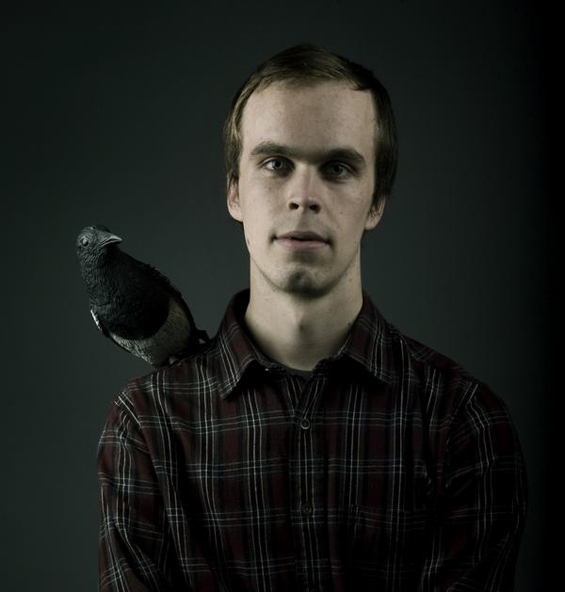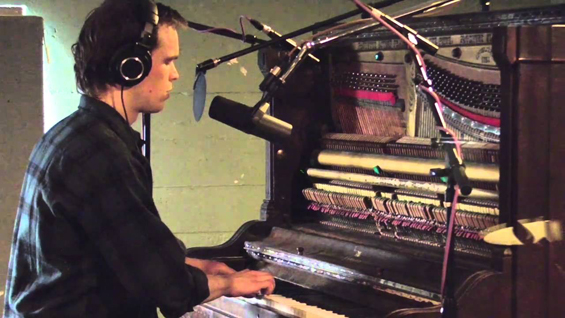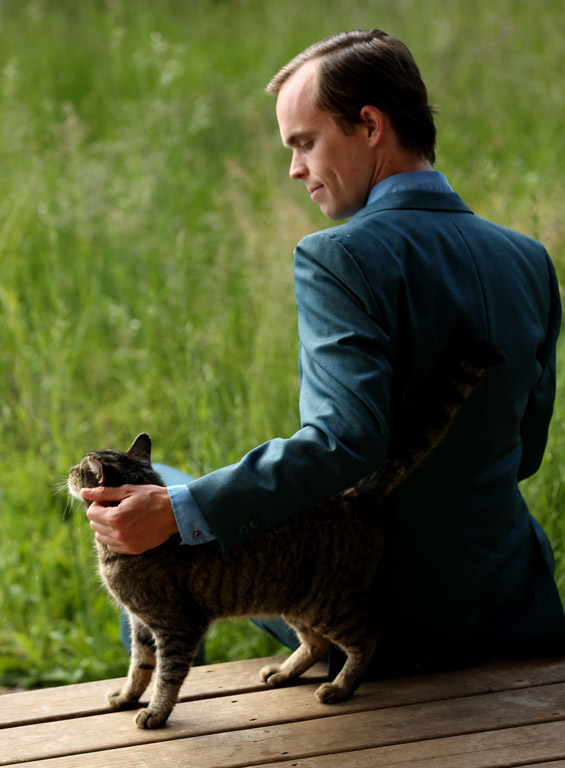

TEN QUESTIONS WITH PETER BRODERICK
So many releases by Peter Broderick (b. 1987) have been reviewed in textura's pages, it's hard to believe he hasn't been the subject of an article or interview until now. As those familiar with his work well know, the Maine-born multi-instrumentalist, composer, and producer is a remarkably versatile individual whose interests extend widely. A scan of his discography reveals that in addition to full-lengths such as Float, These Walls of Mine, and Colours of the Night, he's created solo piano work (Docile) as well as music for a documentary film (Confluence) and dance production (Music for Falling From Trees). He's played with Efterklang and Laura Gibson, collaborated with Greg Haines (under the Greg Gives Peter Space name) and Machinefabriek, and contributed significantly to recent albums by his sister Heather Woods Broderick, Lubomyr Melnyk, and Chantal Acda. A more invaluable collaborator would be hard to imagine.
1. Before visiting your personal site, I knew you to be incredibly prolific and productive, but I almost couldn't believe my eyes when I saw the voluminous list of solo releases, collaborations, split releases, and compilation appearances. The obvious question: how have you managed to produce such a staggering amount of music in a mere nine-year stretch?
I suppose I've just dedicated a lot of time to recording music. And perhaps I've had a hard time saying no to invitations sometimes. These days I find myself picking and choosing projects a little more carefully, aiming to conserve energy and slow down a bit . . . although I'm not sure how successful I've been with that as I seem to have a steady flow of various recording projects. Maybe I'm just addicted to recording music!
2. You would appear to be the living embodiment of the word prodigy, given the number of instruments you learned to play as a teenager and the songwriting ability that already was evident on an early recording such as Float (Type, 2008)? What enabled you to become so proficient so quickly? Was it simply innate talent or the family environment you grew up in?
My family environment certainly encouraged and nurtured music. Both my parents play music as well as both my older siblings, and I grew up in a house full of musical instruments. I do feel very fortunate to have been given the opportunity to explore so many different musical paths. Sometimes I have longed for the patience and/or dedication necessary to pick one thing and stick with it, rather than bouncing around to so many different things all the time. I really admire when people explore one single instrument endlessly. But I've tried to embrace my natural tendency to play many different things.
"Below It" (Home, Bella Union Records)
3. In recent days, you've been involved heavily as an instrumentalist and producer on wonderful albums by your sister, Heather Woods Broderick (Glider, 2015), and Chantal Acda (Let Your Hands Be My Guide, 2013; The Sparkle in Our Flaws, 2015). In what ways did your approach to these projects for the artists differ?
It's always a little different working with each different artist, and I try to be flexible in order to find what my role is in each new collaboration. With Heather we have that life-long entwinement of being siblings, and we've pretty much always had very similar taste and preferences when it comes to music. So in that way we can collaborate really easily without saying much. We approach things from a very similar angle. With Chantal it's more fresh since we've only gotten to know each other over the last few years. But it was very clear to me from the beginning that she saw something in me, something which comes out naturally, and I felt a huge amount of trust from her. And when I feel trusted, I feel very much at ease with collaborating.
4. And how does your approach differ when your role is that of collaborator, as is it is, for example, in the case of your recent album with Felicia Atkinson under the La Nuit name (Desert Television, Beacon Sound), versus that of producer, as in the case of Chantal Acda's albums?
It actually doesn't change as much as you might think. As long as there is mutual trust among everyone involved, I find the creative process flows quite fluidly. I suppose the more involved I am as songwriter and composer, as opposed to just an arranger or engineer, then I have to rely on trusting myself as opposed to other people trusting me. I'd like think I've learned to trust myself musically over the years, but I still do get insecure and have doubts sometimes. That's healthy, I hope!

5. Though every project with which you've been involved has been significant for one reason or another, I'm imagining that a particularly special one was Lubomyr Melnyk's Corollaries (Erased Tapes, 2013), which you recorded and produced for the “Continuous Piano Music” pioneer. Is he someone you had particularly wanted to work with, and what effect did the experience of making the album with him have on you?
I met Lubomyr briefly at a festival, I believe in early 2012, and I was immediately drawn in by his character. After merely hearing him rehearse a bit in the backstage area I purchased a handful of his records directly from him—I had to leave before his performance that day—and on my drive home I fell in love with those records and his vast musical world. I quickly reached out to him expressing how much I was enjoying his music, and asked him if he might be interested in collaborating. And lo and behold he accepted my invitation and came to Berlin for a week just a few months later!
That album is very special to me indeed, and especially the first piece, “Pockets of Light.” That piece is literally the first time he and I ever played music together. We talked a little bit about what we wanted to do, and while he was tuning my piano by hand I sat in the corner and wrote down some words rather quickly, hoping to get his permission to sing them over his piano playing. I showed him the words and he responded positively, so I set up some microphones, hit record, and we played that piece. You can even here me say at the beginning of the track, “Let's just see what happens…”
6. Though a lot of your recent work has focused on contributing to others' albums and collaborations, I'm betting that you're also heavily involved in production work for your next solo release. Can you tell us a bit about that and perhaps when we might expect to see it appear?
I'm actually not really in production of a new solo release at all right now. I've been thinking quite a bit about it, but I'm not sure yet what form that might take. At the moment I'm investing most of my musical energy into recording other people out at my little studio on the Oregon coast. And I've been touring a lot this year, traveling all over the place and playing a lot of concerts. To be totally honest I feel a little unsure right now which direction my solo music should go in. I might take a little time to ponder that for a while.
7. So much has changed in the years since you started formally recording, not just in terms of the music industry and production methods but also with respect to styles going in and out of fashion. What thoughts do you have on the evolution of your own music since you began recording? And is there anything you know now that you wish you'd known at the outset?
I'm a little puzzled by all my different recordings, to be honest! Some of my older material is difficult for me to relate to now. I do still perform a lot of those songs under the assumption that that's what people would like to hear, and I do get a lot of requests to play some of those songs . . . but sometimes I almost feel as if I'm covering someone else's song. At least that's what I tell myself sometimes. Maybe some older lyrics don't resonate so much with me any more, so rather than play the song and think, “These lyrics are stupid,” I'll try and pretend someone else wrote the song and I'm just a guy performing it as best I can, trying to do it justice. Not that I'm at all ashamed of anything I've done . . . it's just that I started releasing music from quite a young age, and I've changed a fair amount since then, so it can be strange when you feel like your audience still expects you to be the same guy you were eight or nine years ago. I can only imagine how it must feel for someone like Bob Dylan who probably feels obligated to play such old, old songs. Maybe he pretends he's covering another artist, too!
8. Though you've worked with so many different artists, I'm curious as to who you haven't yet worked with but would like to? And who would you say have been your greatest influences?
I'd say my greatest influences have been my friends and family. I used to idolize other musicians a lot more, to look at someone's body of work and long to reach their level or something. But now I really try to embrace what's right around me and see those people as just as important as any celebrated artist, even if it's a friend who's never recorded anything and just sings a song by the campfire one night. I can't say there's anyone in particular I long to work with, but I'm sure there are many more people out there I'll combine forces with one day, and I'm curious about that.
9. You would seem to live and breathe music, but I'm presuming that there are times when you like to do other things. What do you listen to (if anything) when you're not creating music, and what non-musical things do you like to do when you have time?
Lately I've been listening to a lot of Nina Simone and Michael Hurley. And I listen back a lot to recordings I'm working on. I really like putting on more ambient and atmospheric music and doing stretches and body movement. Something like yoga, but maybe someone who's really into yoga would laugh at the things I do. I love to cook. Working with food is so much fun. It's like making a sculpture and then getting to eat it! I love to wander aimlessly and get lost when I have the time and energy for that. And my newest hobby is working in the yard, digging through the dirt with my hands and watching things grow. I try to avoid too much internet surfing and movie watching . . . those are things I do when I'm not feeling particularly inspired. But I generally feel much more gratification going outside and having more hands-on experiences.
10. You've travelled extensively since you started recording. What's your favourite place to visit, and is there a particular concert experience you were involved in that stands out as most memorable?
It's impossible for me to pick a favourite place. There are just so many places that have shown me an amazing time. One concert that really stands out for me is the one I did in Riga last year. There I performed in an amazing old church from the 1200s with a forty-piece Latvian choir and string quartet. I had long dreamt of performing with ensembles like that, especially with a choir, and the feeling I got when I first heard those people sing the notes I'd written down is something I'll never forget.

October 2015![]()